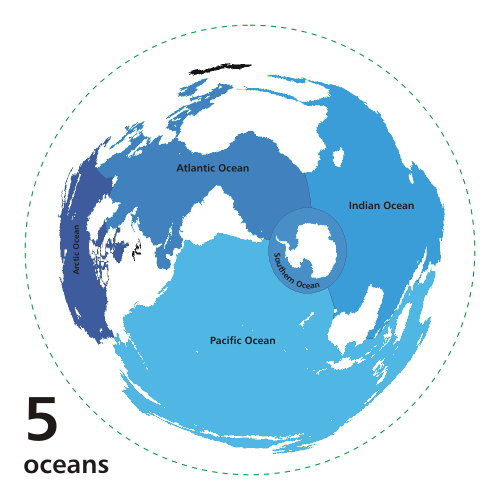Oceans on Earth. Geographic competition
6th Grade – Geography (Bulgarian educational system)
Based on lesson “Oceans on Earth. Geographic competition”
In Geography and economics school book of 6th Grade page 146
|
|
Materials for the lessonThe children bring from home:Plastic/paper plates. Biscuits or sweeties.Four large A2 sheets.Markers – four different colorsTeachers Bell. |
Layout of the classroomThe classroom is organized in a way that 2 desks are put next to each other so 5 or 6 students can sit around. Four pairs of desks are needed in the classroom and 5-6 chairs around it. The rest of desks and chairs are put aside. |
|
Phase 1The teacher divides the class into four groups. (5 students per team, if the class is 20 children i.e.)Each group chooses one of the students to be their host.Each group sits around one of the desks. It is their table in the living room.There they will meet their guests – the students from the other groups.The students of each group cover their tables with A2 sheet. It is their “tablecloth”.Each group decorates their table with sweets and biscuits.On the “tablecloth” of each group is written the name of one of the oceans. (Atlantic Ocean, Indian Ocean, Pacific Ocean and Arctic Ocean) |
|
Phase 2At the beginning of the game the teacher says: “Today we will travel to the ocean world. The trip consists of five visits. We will visit and describe the oceans on the Earth. Each visit has its own name.”The teacher writes the names on the board.1. Geographic position, boundaries2. Specificities of underwater relief3. Specificities of climate and ocean water4. Natural resources5. Protection of the oceanOn the first and last visit the groups write down about their ocean on their table. During the other three, they visit the other groups and write down about the other oceans. |
|
Phase 3The teacher gives a bell signal. For the first visit, the groups have 5 minutes to discuss and write down what they know about their ocean: geographic position, boundaries. For the remaining 4, they have 7 minutes. The groups will also have the opportunity to add that has already been written.The teacher gives a bell signal. The students from each table leave their own and go to the next table. Only the host student does not move. At each visit he meets the new “guests” / other groups /. He first introduced the guests to what was written so far. Guests appreciate if there is something to add.At the last visit, each group returns “home”. The students of each group discuss and write down different ways to protect the ocean. |
|
Phase 4The teacher announces the end of the game with a bell signal.Each host tells what happened at his table: how the groups worked, how the discussions took place, what the emotions were.Finally, each host reads the ocean description. |


 SmartOWL
SmartOWL